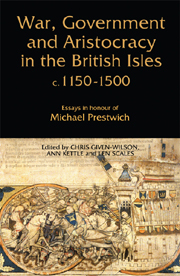 War, Government and Aristocracy in the British Isles, c.1150–1500
War, Government and Aristocracy in the British Isles, c.1150–1500 Book contents
- Frontmatter
- Contents
- List of Contributors
- Introduction
- Abbreviations
- Did Henry II Have a Policy Towards the Earls?
- The Career of Godfrey of Crowcombe: Household Knight of King John and Steward of King Henry III
- Under-Sheriffs, The State and Local Society c.1300–1340: A Preliminary Survey
- Revisiting Norham, May–June 1291
- Treason, Feud and the Growth of State Violence: Edward I and the ‘War of the Earl of Carrick’, 1306–7
- The Commendatio Lamentabilis for Edward I and Plantagenet Kingship
- Historians, Aristocrats and Plantagenet Ireland, 1200–1360
- War and Peace: A Knight's Tale. The Ethics of War in Sir Thomas Gray's Scalacronica
- The King's Secrets: Richard de Bury and the Monarchy of Edward III
- Budgeting at the Medieval Exchequer
- Recent Scholarship on Crusading and Medieval Warfare, 1095–1291: Convergence and Divergence
- The Military Ordinances of Henry V: Texts and Contexts
- Chivalry and English Kingship in the Later Middle Ages
- Cloth of Gold and Gold Thread: Luxury Imports to England in the Fourteenth Century
- Bibliography of the Writings of Michael Prestwich
- Index
- Tabula Gratulatoriad
Budgeting at the Medieval Exchequer
Published online by Cambridge University Press: 12 September 2012
- Frontmatter
- Contents
- List of Contributors
- Introduction
- Abbreviations
- Did Henry II Have a Policy Towards the Earls?
- The Career of Godfrey of Crowcombe: Household Knight of King John and Steward of King Henry III
- Under-Sheriffs, The State and Local Society c.1300–1340: A Preliminary Survey
- Revisiting Norham, May–June 1291
- Treason, Feud and the Growth of State Violence: Edward I and the ‘War of the Earl of Carrick’, 1306–7
- The Commendatio Lamentabilis for Edward I and Plantagenet Kingship
- Historians, Aristocrats and Plantagenet Ireland, 1200–1360
- War and Peace: A Knight's Tale. The Ethics of War in Sir Thomas Gray's Scalacronica
- The King's Secrets: Richard de Bury and the Monarchy of Edward III
- Budgeting at the Medieval Exchequer
- Recent Scholarship on Crusading and Medieval Warfare, 1095–1291: Convergence and Divergence
- The Military Ordinances of Henry V: Texts and Contexts
- Chivalry and English Kingship in the Later Middle Ages
- Cloth of Gold and Gold Thread: Luxury Imports to England in the Fourteenth Century
- Bibliography of the Writings of Michael Prestwich
- Index
- Tabula Gratulatoriad
Summary
In 1984 Michael Prestwich published a noteworthy document which had found its way into the archives of Durham Cathedral Priory. It was a demand by the parliamentary Commons that the proceeds of certain specified revenues should be used for the defence of the realm. On internal evidence Professor Prestwich was able to date this to the autumn parliament of 1377, and argued that it formed part of the Commons' response to the king's demand for taxation. The list comprised the wool subsidies and a variety of occasional, or casual, revenues, and although the first were valued at a conventional figure, most of the other estimates were grossly exaggerated. Despite its inaccuracies the document is valuable as being the only known occasion on which the commons proffered their own estimate of crown revenue as a riposte to the council's use of such to justify taxation. The records of council and parliament contain frequent references to financial statements in one form or another, and I propose to examine their nature and context, and if possible arrive at some conclusions about how and why they were produced, what purpose they served, and how accurate were their figures. We must ask whether they were purely for debate and persuasion or whether they provided the framework for a coherent financial policy. Although at times opaque, inaccurate, and even tendentious, they deserve careful scrutiny for what they can tell us of the workings of crown finance and the assumptions on which it rested.
- Type
- Chapter
- Information
- War, Government and Aristocracy in the British Isles, c.1150–1500Essays in Honour of Michael Prestwich, pp. 179 - 196Publisher: Boydell & BrewerPrint publication year: 2008


